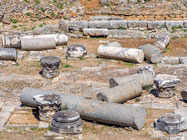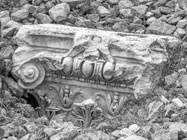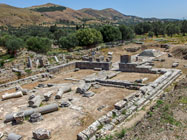|
Home
Page 1/3
Page 2/3 (this page)
Page 3/3



|
The origin of marble from ancient times:
Gortyna (Crete)
webpage 2/3
Text: Annemieke van Roekel
Ongoing excavations
In Roman times, Gortyna was the capital of the province that included
both Crete and Cyrenaica, the eastern part of present-day Libya.
Excavations there started at the end of the 19th century and have never ceased since. With
an area of 4 square km, Gortyna is very extensive and even flocks of sheep are walking around;
the city is intersected by a motorway.
Excavations have started in the part north of the road; from the beginning of the 20th
century, the excavations were moved to the south-eastern part (fig. 4-6).
The city was destroyed in the Middle Ages and has never been rebuilt. As a result, many buildings,
sculptures and ornaments have remained intact.



Fig. 4. Excavations in the south-eastern part of Gortyna. Fig. 5. Detail of a capital. Fig. 6. Temple of Apollo.
Photo's: Andreas Fischer-Happel.
Local limestone
For sculptures and ornaments, especially for public buildings, (imported) marble was used; local
limestone was used for other buildings and pavement. The limestone quarries have resulted in a
labyrinth of passageways known as Labyrinth Cave. Marble statues were imported ready-made,
but also produced in the city itself.
In the past fifty years, mainly artefacts from the Roman period have been excavated, of various types of rock:
white and yellow porous limestone ("porolithoi") and white and colored local and (mainly) imported
marbles. From Crete itself, poor quality "gray marble" comes from a quarry in Agios Kyrillos, near
Gortyna in the Asterousia Mountains (Antonelli, 2017). The latter was only used in
architectural elements and not for sculptures.
Page 1/3
Page 2/3 (this page)
Page 3/3
Top photo: Andreas Fischer-Happel.
Copyright: Annemieke van Roekel
Last update: June 25, 2022
|